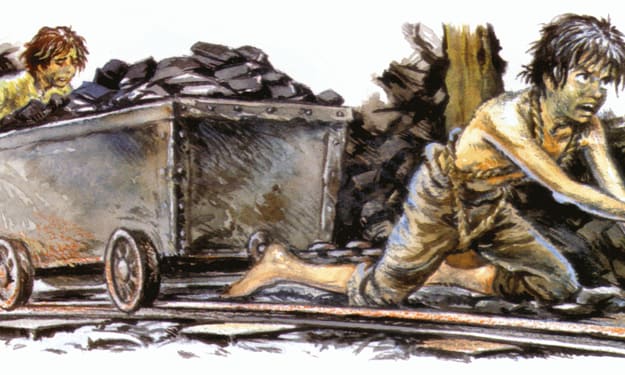'Girls Mature Faster'—Is This a Fact or Simply an Excuse to Treat Girls More Harshly?
Do we use the 'girls mature faster' belief to impose more responsibilities on young girls as opposed to their male peers? What effects does that have on their later life?

Not so long ago, I was aimlessly scrolling through the news and I came across an article describing a controversial video that had gone viral. It consisted of Vladimir Putin’s top pilot team dancing around, extremely underdressed, and performing household tasks to the early 2000s hit "Satisfaction." It struck me as quite a sexual video, almost like a male version of the music video for the Benny Benassi song. As I scrolled down the article I saw the words: “Nothing is disgraceful here, just young lads with a good sense of humour.”
I was dumbfounded.
Don’t get me wrong, the video does not bother me at all. The comment, however, hit me hard. My mind immediately went to an alternative scenario: what if it was a girls’ cadet team that did this? Would people be debating whether it was something questionable or just girls with a good sense of humour? It would have immediately been deemed a scandal. The girls would be called attention-seekers, not people with a good sense of humour. After all, girls are not supposed to do anything for a laugh.
I used to impassively scroll past comments questioning the science behind the so-called ‘fact’ that girls mature faster. Scientists said so, so it was true, right? Newcastle University studies found out that girls’ brains do begin to mature at the age of ten, while some boys need to wait until they’re 20 for that to start happening. I don’t doubt that this is true and I am not denying science, but sitting there on my bed, reading that comment, my whole childhood and adolescence flashed before my eyes in a bleaker, sadder version of the past I look back at.
Take my nursery, for example. I was around five years old when I first had to tell a boy to stop chasing me around and pulling my hair. I told my teacher later, and she told me that he did that because he must like me. I spent my nursery year in the girls’ toy section—a corner that contained a play kitchen. We played family; feeding toy babies and putting them to sleep whilst through the window I watched boys running wild and getting their knees and elbows scraped as they dived in the air to catch the ball.
At home, I would look through a pink-paged catalogue advertising toys for girls and my choices were between a mini washing machine and a baby buggy. No wonder girls mature faster when all their childhood toys are just ways to impose responsibilities upon them. My own mum never really put much thought into what she bought me. When I wanted a race-track or a Lego set she would never discourage me from wanting so-called ‘toys for boys.’ I did have Barbie dolls and Bratz dolls but I picked race cars and toy guns over a doll any day of the week. In nursery, however, I was ridiculed for it. I realised that although I may not be forced into specific gender roles, my peers clearly were. I remember girls and boys laughing at me because my pretty white tights were ripped and bloody at the knees; or that I wasn’t play-cooking in the girls’ corner, pretending to be a middle-aged mother in the body of a five-year old girl. When boys disrupted the whole class I observed the teachers join in on their jokes. I whispered something to my friend and was immediately shut down for what the teacher referred to as ‘gossiping’.
All the movies I’ve watched in the past flash before my eyes in one hasty blur and the words “Mummy will be away for a while, so you have to look after your brother” echo deafeningly in my ears. I see a woman preparing seven frozen meals in sheer panic and packing them into plastic containers so that the father does not have to worry about the food for when his wife is away. I see a little twelve-year old girl that is reminded to do the dishes after every meal for when her mother can’t. I also see her brother, playing his console in the game room while his sister is taught to become a housewife overnight. Just like that.
After this realisation, I see everything differently. High school boys disrupting the whole class by talking about sports and having the teacher join in on the conversation while I’m sitting in detention because I forgot to wipe my weekend nail varnish off on a Monday morning. Maybe girls get better grades than boys not because we want to but because we’re brought up to be so straight-edge and well-behaved. It seems rather ignorant to assume girls perform better than boys because they are more mature and intelligent, as it completely neglects the point that sociological factors must also be to blame. It is hardly ever just nature or nurture. The two sides have both shaped us into the people we are now. However, this doesn’t mean that they equally play the part, and from looking back on my life and the lives of all the women in my life, it is clear that our genes barely made any difference.
I mean, girls do hit puberty earlier than boys. Their brains mature at a younger age, they do better in school, blah blah blah. Yet the most important question remains: what actually defines maturity? A quick Google search on the word ‘mature’ proves to be surprisingly problematic. The first definition that popped up stated that ‘mature’ means “fully-developed physically” (Key word: physically). Since when does my physical state define my mental growth? By assuming that a girl has matured just because she hit puberty completely ignores her personal feelings. The utterly heart-breaking thing about this mindset is that it suggests that a girl’s mind is defined by her body. I mean, I didn’t exactly feel ready for a baby simply because I had blood in my pants. Yet every single relative I knew threw the “you are now a woman” words in my face as if the fact that I now had so many more expectations imposed on me was a good thing, as if I was expected to carry the word ‘woman’ with pride when so far all that that meant to me was a life ripped off its pleasures. For God’s sake—I was twelve!
Perhaps it is not a matter of gender but a matter of how much hardship you faced in your lifetime. It is not nature, it is nurture: the nurture of parents that tell us not to stay out late and never walk alone. The nurture of teachers that let boys bully us for our appearance and then punish us for talking in class. The nurture of a society perpetuated by rape culture that tells us that if boys treat us like objects they must like us; a society that tells boys it’s okay not to keep your hands to yourself; a society that justifies an underage girl dating an older guy with, “But she’s far more mature than her actual age;” a society that allows young girls to marry middle-aged men; a society that suspends a 14-year-old girl from school because she spoke out against her rapists. A society that reacts to violence against girls with an impassive “boys will be boys” just so they can go on with their lives and not have to deal with it. A society that does not care. We are a society that allows atrocities to happen to the female population as the world flips through Metro on Monday mornings, barely batting an eyelid at articles of rape, assault and murderous revenge plots of furious ex-boyfriends. We are a society in which girls live in fear while the boys outside our windows run wild without a care in the world. This society clearly has to change.
My biggest concern is what such a childhood may lead to in the future. Is this the reason women refuse to leave abusive partners? Is it because they feel somewhat responsible? Perhaps teaching young girls that they have carry so much responsibility is the reason to why women often blame themselves for their own rape. After all, the words of fathers that say “you are not going out like that” will linger in the back of a teenage girl’s mind forever. If something happens to them, they will blame themselves. We are taught that whatever happens to us, whatever we go through, is always our own fault. I was once told by an older woman that if women don’t want to get raped they should stop going to clubs. I remember thinking about how rape can happen literally anywhere. Am I not meant to go to school either? What about grocery shopping, which is said to be the most common location for rapists to seek their victims. Should I give that up too?
The world needs to remember that imposing so much responsibility on little girls will reflect on them in different ways in their futures. When we teach girls that they are responsible for their brothers, we subconsciously teach them that they will also once be responsible for their abusive partners. When we teach girls that when boys like them they will be mean to them, we teach them that abuse is a sign of love, and later we will blame them for not leaving a toxic relationship.
We need to not only rethink our definitions of maturity, but also keep in mind that children are the most impressionable. The words of an authority figure that a child admires and looks up to will stay with them forever, always echoing in their minds. Authority figures – parents, teachers, their favourite fictional characters, need to stop preaching about things that later lead to self-loathing behaviour and self-blame. Authority figures need to start teaching girls self-expression. Young girls need the freedom to enjoy and explore life during childhood, a freedom that will later develop into self-love and independence. Something that finally needs to be encouraged in women.
About the Creator
Vicky Babczyk
18 year old with a passion for writing in all categories :)






Comments
There are no comments for this story
Be the first to respond and start the conversation.